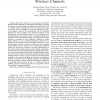Free Online Productivity Tools
i2Speak
i2Symbol
i2OCR
iTex2Img
iWeb2Print
iWeb2Shot
i2Type
iPdf2Split
iPdf2Merge
i2Bopomofo
i2Arabic
i2Style
i2Image
i2PDF
iLatex2Rtf
Sci2ools
INFOCOM
2009
IEEE
2009
IEEE
On Fast Optimal STDMA Scheduling over Fading Wireless Channels
—Most prior studies on wireless spatial-reuse TDMA (STDMA) link scheduling for throughput optimization deal with the situation where instantaneous channel state information (CSI) is available. Under fast fading, however, the channel may change too quickly for the scheduler to track the instantaneous CSI. In this paper, instead of the instantaneous CSI, the scheduler performs its task according to the stochastic behavior of the channel state. A basic schedule consists of a set of simultaneously transmitting links. The essence of the scheduling problem is to determine a mixed schedule consisting of a weighted sum (TDMA mixture) of a number of basic schedules to optimize a certain utility objective. A key to reducing scheduling complexity is to identify the Pareto-efficient basic schedules, referred to as the extreme-point schedules, so that the construction of the optimal mixed schedule can be based on the extreme-point schedules rather than all the basic schedules. The precise identi...
| Added | 24 May 2010 |
| Updated | 24 May 2010 |
| Type | Conference |
| Year | 2009 |
| Where | INFOCOM |
| Authors | JiaLiang Zhang, Soung Chang Liew, Liqun Fu |
Comments (0)

